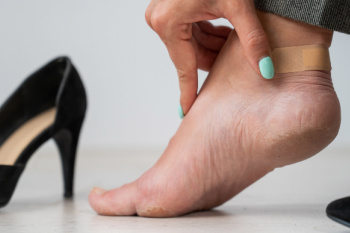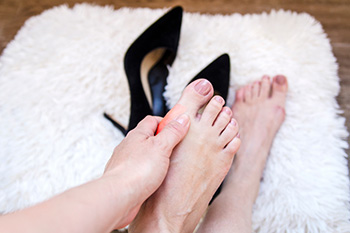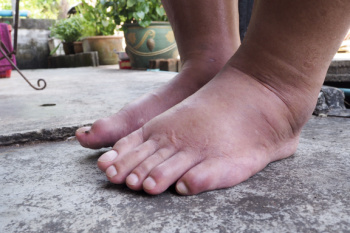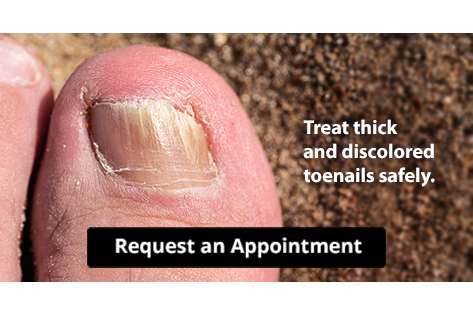Connect With Us
Blog
Items filtered by date: August 2024
Stop Your Toenail Fungus
Friction Blisters on the Feet and How to Prevent Them

Friction blisters on the feet occur when repeated rubbing against the skin causes fluid-filled sacs to form, often leading to pain and discomfort. These blisters typically develop in areas where shoes or socks cause excessive friction. To prevent friction blisters, choosing well-fitting footwear that provides adequate support and cushioning is vital. Opting for moisture-wicking socks helps reduce friction and keeps feet dry. Additionally, using blister prevention tape or pads on areas prone to friction can provide an extra layer of protection. Ensuring that shoes are properly broken in before extensive use also helps to minimize the risk. If you have blisters on your feet that are bothersome or have become infected, it is suggested that you consult a podiatrist who can treat this condition, and offer you effective prevention methods.
Blisters are prone to making everyday activities extremely uncomfortable. If your feet are hurting, contact Melissa C. Verde, DPM of Florida. Our doctor can provide the care you need to keep you pain-free and on your feet.
Foot Blisters
Foot blisters develop as a result of constantly wearing tight or ill-fitting footwear. This happens due to the constant rubbing from the shoe, which can often lead to pain.
What Are Foot Blisters?
A foot blister is a small fluid-filled pocket that forms on the upper-most layer of the skin. Blisters are filled with clear fluid and can lead to blood drainage or pus if the area becomes infected.
How Do Blisters Form?
Blisters on the feet are often the result of constant friction of skin and material, usually by shoe rubbing. Walking in sandals, boots, or shoes that don’t fit properly for long periods of time can result in a blister. Having consistent foot moisture and humidity can easily lead to blister formation.
Prevention & Treatment
It is important to properly care for the affected area in order to prevent infection and ease the pain. Do not lance the blister and use a Band-Aid to provide pain relief. Also, be sure to keep your feet dry and wear proper fitting shoes. If you see blood or pus in a blister, seek assistance from a podiatrist.
If you have any questions, please feel free to contact our office located in Longwood, FL . We offer the newest diagnostic and treatment technologies for all your foot care needs.
Why High Heels Are Bad for Your Feet

High heels may look great, but they can cause significant foot problems and impact overall body health. The pressure and angle of high heels can lead to a range of issues, such as bunions, hammertoes, and neuromas, often requiring surgery to correct. Wearing high heels also affects your posture, which can lead to back, leg, and foot pain as the body tries to compensate for the imbalance they create. The altered gait from wearing heels can overwork the hip flexors and knee muscles, increasing the risk of joint and muscle pain. Balance is also compromised, increasing the likelihood of falls and sprained ankles. High heels force the lumbar spine to flatten and the thoracic spine to curve excessively, possibly causing chronic back pain. The continuous flexing of hip muscles can lead to their contraction and shortening, contributing to hip and lower back pain. Consulting a podiatrist can provide valuable insights and treatments tailored to individual needs. If you have foot pain related to wearing high heels, it is suggested that you schedule an appointment with a podiatrist for a diagnosis and treatment.
High heels have a history of causing foot and ankle problems. If you have any concerns about your feet or ankles, contact Melissa C. Verde, DPM from Florida. Our doctor can provide the care you need to keep you pain-free and on your feet.
Effects of High Heels on the Feet
High heels are popular shoes among women because of their many styles and societal appeal. Despite this, high heels can still cause many health problems if worn too frequently.
Which Parts of My Body Will Be Affected by High Heels?
- Ankle Joints
- Achilles Tendon – May shorten and stiffen with prolonged wear
- Balls of the Feet
- Knees – Heels cause the knees to bend constantly, creating stress on them
- Back – They decrease the spine’s ability to absorb shock, which may lead to back pain. The vertebrae of the lower back may compress.
What Kinds of Foot Problems Can Develop from Wearing High Heels?
- Corns
- Calluses
- Hammertoe
- Bunions
- Morton’s Neuroma
- Plantar Fasciitis
How Can I Still Wear High Heels and Maintain Foot Health?
If you want to wear high heeled shoes, make sure that you are not wearing them every day, as this will help prevent long term physical problems. Try wearing thicker heels as opposed to stilettos to distribute weight more evenly across the feet. Always make sure you are wearing the proper shoes for the right occasion, such as sneakers for exercising. If you walk to work, try carrying your heels with you and changing into them once you arrive at work. Adding inserts to your heels can help cushion your feet and absorb shock. Full foot inserts or metatarsal pads are available.
If you have any questions please feel free to contact our office located in Longwood, FL . We offer the newest diagnostic and treatment technologies for all your foot and ankle needs.
Key Facts About Lipedema and Cankles

Lipedema is a chronic condition characterized by abnormal fat accumulation, typically in the legs and buttocks, which leads to swelling and a disproportionate appearance. This condition often results in a distinctive cankle appearance, where the ankles and calves blend together without a clear definition. Lipedema primarily affects women and can cause discomfort, pain, and increased sensitivity in the affected areas. The exact cause of lipedema is not fully understood but may involve hormonal changes or genetic factors. Managing lipedema often includes lifestyle modifications, such as a balanced diet and regular exercise, and may involve specific medical treatments for relief. If you notice symptoms of lipedema or cankles, it is suggested that you consult a podiatrist who can obtain a proper diagnosis and explore effective treatment options.
Swollen feet can be a sign of an underlying condition. If you have any concerns, contact Melissa C. Verde, DPM of Florida. Our doctor can provide the care you need to keep you pain-free and on your feet.
Swollen feet are a common ailment among pregnant women and people who stand or sit for extended periods. Aging may increase the possibility of swollen feet and patients who are obese often notice when their feet are swelling too. There may be medical reasons why swollen feet occur:
- Phlebitis - A condition that causes the veins to become inflamed and can also cause leg pain.
- Liver disease - This may lead to low blood levels of albumin which is a protein. This can cause fluid in the blood to pass into the tissues and several areas of the body can become swollen.
- Heart failure - When the heart doesn’t pump properly the blood that is normally pumped back to the heart can pool in the veins of the legs causing swollen feet.
- Kidney disease - One of the main functions of the kidneys is releasing excess fluid in the body. This type of condition can make it difficult for the kidneys to function properly, and as a result the feet may become swollen.
- Deep-vein thrombosis (DVT)- This is a serious condition where blood clots form in the veins of the legs. They can block the return of blood from the legs to the heart which may cause the feet to swell. It is important to be treated by a podiatrist if this condition is present.
Swollen feet can also be caused by bone and tendon conditions, including fractures, arthritis, and tendinitis. Additionally, there may be skin and toenail conditions and an infection may cause the feet to swell. Patients who take medicine to treat high blood pressure may be prone to getting swollen feet.
Many patients elevate their feet to help relieve the swelling and this is generally a temporary remedy. When a podiatrist is consulted the reason behind the swelling can be uncovered and subsequently treated.
If you have any questions please feel free to contact our office located in Longwood, FL . We offer the newest diagnostic tools and technology to treat your foot and ankle needs.

